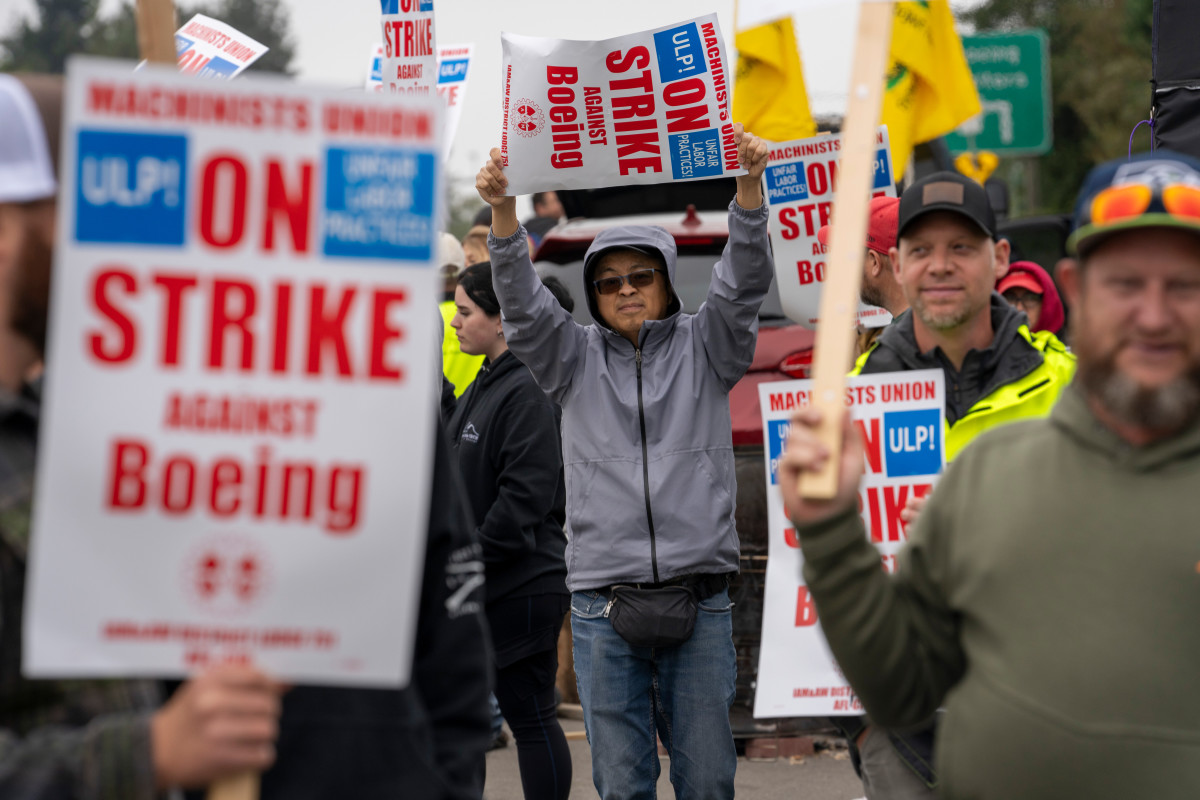
There was hope Wednesday afternoon that the 33,000 machinists who had been striking Boeing Co. (BA) since Sept. 13 would ratify the new contract offer.
It was management's hope. It was also Wall Street's hope. The shares had fallen 1.8% in regular trading on Wednesday to $157.06, but they rose in after-hours trading to $157.92, with the last trades coming at 8 p.m. ET, just as the voting on the new machinists' contract ended.
Don't miss the move: Subscribe to TheStreet's free daily newsletter
The hopes were soon dashed. About 64% of the members Local 751 of the International Association of Machinists and Aerospace Workers voted to reject the contract.
Related: Tesla stock leaps on solid Q3 earnings, delivery growth outlook
What Boeing proposed to give workers in its contract offer
It was the third time the union had said no to a proposal that might bring peace between workers and Boeing after a year of fraught talks. In the first vote, 94% of workers voted no. The union refused to bring a second proposal to a vote.
The newest proposal, agreed to only on Saturday, would have boosted worker wages more than 35% over the four-year life of the contract, boosted the ratification bonus, added more money to the 401(k) plan and added other benefits.
Crucially, however, Boeing refused to restart its defined benefit plan.
The shares are likely to tumble again on Thursday. The shares were off more than 3.6% at 141 euros in early trading in Germany.
With Wednesday's close in New York, Boeing shares are down 39.75% this year, though up 3% for the week through Wednesday.
More on Boeing
- Can Boeing Stabilize Here or Is There More Risk?
- Boeing makes a harsh decision to repair its finances amid strike
- Boeing's tumultuous company history: 12 CEOs in 11 decades
Machinists say Boeing has mistreated workers 'year after year'
The strike vote was held in multiple locations in Washington, Oregon and California. Polls closed at 5 p.m. PT, with the result announced in the early evening.
In a statement, the IAM said the vote was "clear evidence that there are consequences when a company mistreats its workers year after year."
But they called for more negotiations.
Boeing had no comment late Wednesday.
Earlier Wednesday, Boeing had reported a $6 billion loss for the third quarter largely due to the strike.

Boeing's woes are years in the making
CEO Kelly Ortger, on the job just 70-odd days, told analysts that turning Boeing around would take years and requires major changes in company culture.
"The trust in our company is eroded. We’re saddled with too much debt," he said during the company's third-quarter earnings call. "We’ve had serious lapses in our performance across the company, which has disappointed many of our customers.”
Related: A timeline of Boeing's CEOs: From engineers to bean counters
Boeing has had a tumultuous six years. Two 737 Max planes crashed in Indonesia and Ethiopia, killing 346 people.
This past January, a door plug blew off a Boeing-made plane flying from Portland, Ore., to Ontario, Calif. Miraculously, the pilots coaxed the plane back to Portland with only a few injuries.
Many critics say Boeing management had lost their way over the last 20-to-30 years.
"They focused on shareholder value," aviation consultant Mike Boyd told CNBC early Thursday. "They forgot about product value and customer value."
Related: Veteran fund manager sees world of pain coming for stocks







